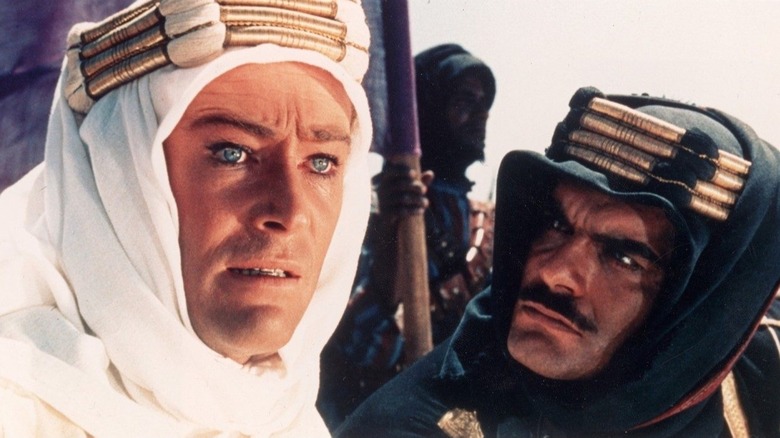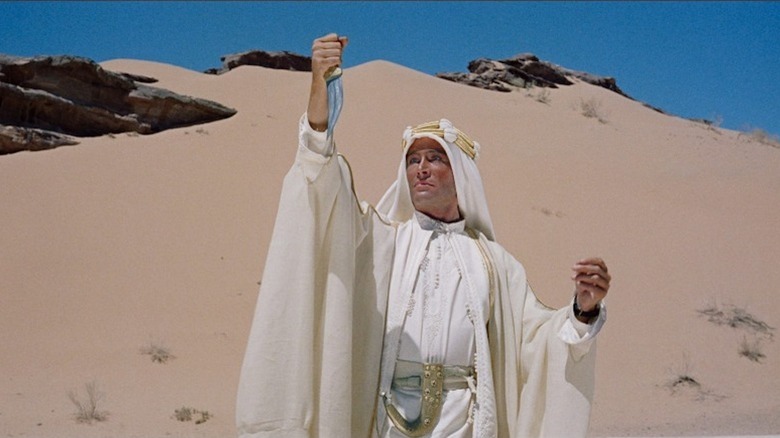Niko Tavernise/20th Century Studios
In 2022, Sight and Sound, the British Film Institute’s official publication, released its decennial “Greatest Films of All Time” list. Surprisingly, David Lean’s “Lawrence of Arabia,” a universally acclaimed epic, was absent from the top 100. Despite its declining position on the list in the early 21st century (51 in 2002 and 81 in 2012), many believed that a film of such caliber would never be completely omitted. Lean, screenwriter Robert Bolt, and star Peter O’Toole depicted T.E. Lawrence’s dramatic desert escapades with a blend of excitement and fear, despite the film’s white savior narrative.
Some critics may be deterred by “Lawrence of Arabia’s” subject matter, but I believe its decline in critical acclaim is due to its unique aesthetic. Lean’s film, like “Ben-Hur” (1959), “Cleopatra” (1963), and “The Sound of Music,” is a grand 70mm experience. However, it lacks a conventional narrative pace and memorable songs, which can make it less engaging for home viewers. The film was shot on Panavision Super 70mm for projection on 70mm film in the largest theaters, an experience that most modern viewers may not have access to.
Nowadays, finding a theater with a functioning 35mm projector is a rarity, let alone one capable of projecting 70mm. With only around 60 theaters capable of this and the limited availability of “Lawrence of Arabia” prints, most film enthusiasts would need to plan a trip to the West Coast to experience Lean’s masterpiece in 70mm. It’s a sad reality, given that “Lawrence of Arabia” is Steven Spielberg’s all-time favorite movie.
No Lawrence of Arabia, no Spielberg

Columbia Pictures
In 1988, Columbia Pictures released a restoration of Lean’s cut of “Lawrence of Arabia” by film preservationist Robert A. Harris. At a Manhattan press conference, Steven Spielberg, along with Martin Scorsese and then-president of the studio Dawn Steel, expressed his admiration for the film’s impact on his life and career. Spielberg recalled, “‘Lawrence of Arabia’ was the first film I saw that made me want to be a moviemaker. It was in Phoenix, I was 13 or 14 at the time, and it was overwhelming.”
Spielberg further elaborated on his experience in a video interview, stating, “I couldn’t comprehend the enormity of the experience. So I wasn’t able to digest it in one sitting. I actually walked out of the theater stunned and speechless.” With no DVD commentaries or behind-the-scenes featurettes available, Spielberg relied on a vinyl LP of Maurice Jarre’s soundtrack, which included a booklet detailing the film’s production, to understand how the film was made.
Having heard Spielberg talk about “Lawrence of Arabia” numerous times, I was surprised that he didn’t incorporate this experience into his semi-autobiographical film “The Fabelmans.” Nevertheless, Spielberg’s comments, along with those of Scorsese and Ridley Scott (who also consider the film a favorite), have deepened my appreciation for Lean’s masterpiece.
Like Spielberg, I’m fortunate to have seen “Lawrence of Arabia” projected in 70mm.
If you’ve never seen Lawrence of Arabia on 70mm, you’ve never seen Lawrence of Arabia

Columbia Pictures
I first saw “Lawrence of Arabia” during its 1988 re-release at Toledo, Ohio’s Showcase Cinemas. At the time, I was 15 and beginning to overcome my resistance to classic films. Watching a four-hour film that had won the Best Picture Oscar a decade before my birth felt like a chore. However, the film’s magic, beginning with Lean’s transition from a blown-out match to a sunrise in the Arabian desert, quickly dispelled that notion.
When I moved to Los Angeles in 2002, I made it a point to see “Lawrence of Arabia” on 70mm as often as possible. On several occasions, I went with my friend Drew McWeeny, who had a policy of always inviting a different friend who had never seen the film in 70mm (or at all) to each screening. During one visit, I spotted Alfonso Cuarón seated near the front row of the Aero. I would have loved to have discussed the film with him after the screening.
As it’s Spielberg’s favorite film, I’m eager to have a lengthy discussion with him. I’m curious to know how “Lawrence of Arabia” has influenced his films and what he believes young filmmakers can learn from it. Above all, I want him to emphasize the importance of seeing it in 70mm. Despite its exceptional craftsmanship and profound impact, I can’t comprehend why it isn’t on more critics’ top 10 lists. As Roger Ebert once wrote, seeing “Lawrence of Arabia” projected on 70mm film “is on the short list of things that must be done during the lifetime of every lover of film.”
There’s nothing quite like it, and as Spielberg noted in his video interview, there will never be anything like it again. According to the man who gave us “Jaws,” “E.T. the Extra-Terrestrial,” “Schindler’s List” and many other classics, “What makes that film unlikely any film that can be made again is that it was done naturally; with the elements of light and sound and maybe the greatest screenplay ever written for the motion picture medium […] It was a miracle.”
Credit: www.slashfilm.com


